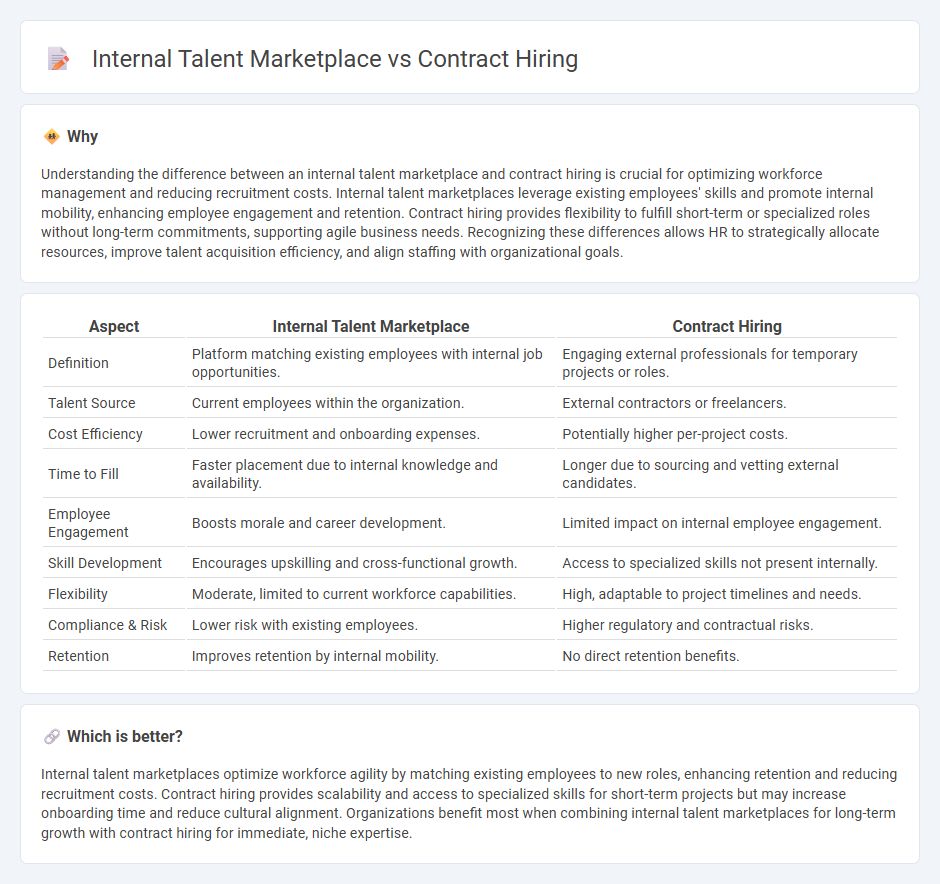
Internal talent marketplaces leverage existing employee skills and promote career development within the organization, leading to higher retention and reduced recruitment costs. Contract hiring offers flexibility by onboarding specialized external professionals for specific projects or timeframes, addressing immediate skill gaps efficiently. Explore how these strategic workforce solutions can optimize your talent management and business agility.
Why it is important
Understanding the difference between an internal talent marketplace and contract hiring is crucial for optimizing workforce management and reducing recruitment costs. Internal talent marketplaces leverage existing employees' skills and promote internal mobility, enhancing employee engagement and retention. Contract hiring provides flexibility to fulfill short-term or specialized roles without long-term commitments, supporting agile business needs. Recognizing these differences allows HR to strategically allocate resources, improve talent acquisition efficiency, and align staffing with organizational goals.
Comparison Table
| Aspect | Internal Talent Marketplace | Contract Hiring |
|---|---|---|
| Definition | Platform matching existing employees with internal job opportunities. | Engaging external professionals for temporary projects or roles. |
| Talent Source | Current employees within the organization. | External contractors or freelancers. |
| Cost Efficiency | Lower recruitment and onboarding expenses. | Potentially higher per-project costs. |
| Time to Fill | Faster placement due to internal knowledge and availability. | Longer due to sourcing and vetting external candidates. |
| Employee Engagement | Boosts morale and career development. | Limited impact on internal employee engagement. |
| Skill Development | Encourages upskilling and cross-functional growth. | Access to specialized skills not present internally. |
| Flexibility | Moderate, limited to current workforce capabilities. | High, adaptable to project timelines and needs. |
| Compliance & Risk | Lower risk with existing employees. | Higher regulatory and contractual risks. |
| Retention | Improves retention by internal mobility. | No direct retention benefits. |
Which is better?
Internal talent marketplaces optimize workforce agility by matching existing employees to new roles, enhancing retention and reducing recruitment costs. Contract hiring provides scalability and access to specialized skills for short-term projects but may increase onboarding time and reduce cultural alignment. Organizations benefit most when combining internal talent marketplaces for long-term growth with contract hiring for immediate, niche expertise.
Connection
Internal talent marketplaces leverage contract hiring to dynamically match employee skills with project needs, enhancing workforce agility and reducing time-to-fill positions. These platforms categorize skills and availability, enabling seamless deployment of contract hires alongside permanent staff to meet fluctuating business demands. Integrating contract hiring within internal talent marketplaces optimizes resource utilization and supports strategic talent management.
Key Terms
Employment Agreement
Employment agreements in contract hiring are typically fixed-term, outlining specific project deliverables and limited benefits, with clear termination clauses tailored to short-term engagements. In contrast, internal talent marketplace agreements emphasize flexible employment terms, often allowing movement across departments with continuous benefits and career development provisions aligned to long-term organizational goals. Explore further to understand how these employment structures impact workforce agility and legal compliance.
Talent Mobility
Contract hiring offers flexibility by onboarding specialized skills for short-term projects, while internal talent marketplaces enhance talent mobility by matching existing employees to new roles and development opportunities within the organization. Leveraging internal talent marketplaces increases employee engagement, reduces hiring costs, and accelerates skill development through dynamic internal job matching platforms. Explore how internal talent marketplaces can transform your workforce strategy and boost talent mobility.
Workforce Flexibility
Contract hiring offers companies immediate access to specialized skills for short-term projects, enabling rapid scaling without long-term commitments. Internal talent marketplaces leverage existing employees' skills for dynamic role matching, enhancing workforce flexibility through continuous talent development and internal mobility. Explore how each approach can optimize your workforce strategy for agility and efficiency.
Source and External Links
What Is a Contract Employee? | Indeed.com - Contract hiring involves bringing in specialized talent for a short-term project with benefits such as lower commitment, reduced costs, access to specific skills, and less use of company resources, though it may pose challenges like less loyalty and communication difficulties for remote roles.
Contract to Hire - Sparks Group - Contract to hire is a staffing approach where candidates are employed short-term with the potential to transition to full-time employment after a trial period, allowing employers to evaluate skills and cultural fit while saving hiring time and costs.
What Is a Contract Job, and How Does It Work in 2025? - Upwork - A contract job hires a worker for a defined task within a set timeframe and pay, useful for businesses to manage seasonal needs or projects without full-time hires and for professionals wanting flexible, skill-expanding opportunities.
 dowidth.com
dowidth.com